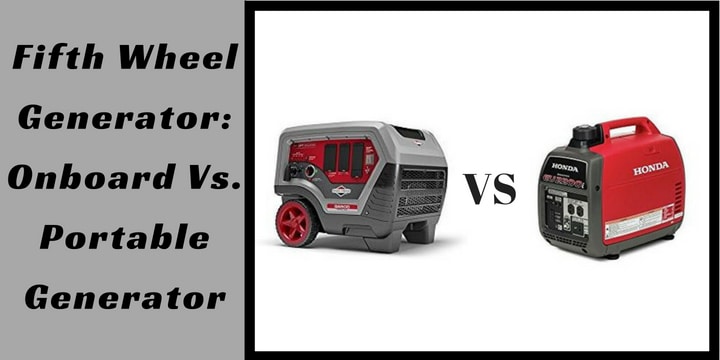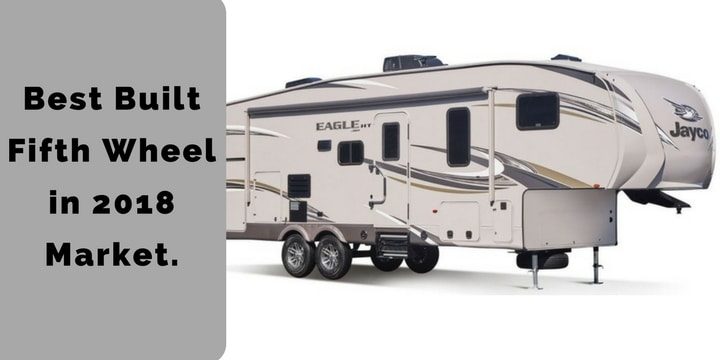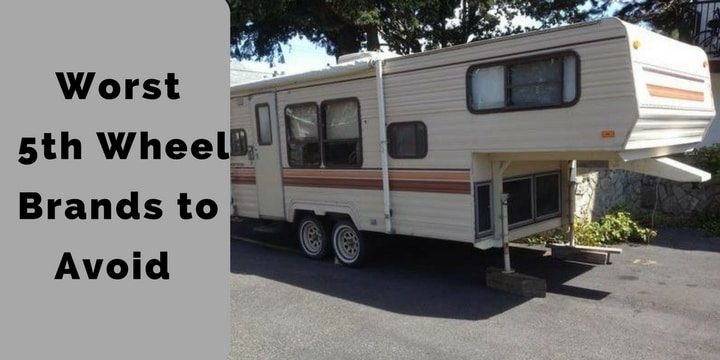Fifth Wheel Generator: Onboard Vs. Portable Generator
When deciding on a generator for your RV, it’s always a good idea to weigh up what exactly you’ll be needing that additional power for. Power output not only is vital to a successful camping trip, but it also makes life on the road a little bit more comfortable.
Asking simple, yet crucial questions about estimating how much power you will need, or how much work your generator will need to do’, is key in deciding on whether a portable generator is needed, or the onboard generator will do the job.
Onboard generators
While onboard generators, so-called generator ready’ units are useful for their convenience, it can often be the case that these onboard generators emit not only noise but also fumes. Weight is the biggest issue when opting for an onboard generator, and one must be prepared to add some extra pounds to their fifth wheeler. Consider storage space. If your fifth wheeler has a cozy amount of free space used for other things then an onboard generator might eat this space up.
Portable generators
Portable generators provide that extra bit of power needed to run your RV appliances. Typically, portable generators are rated based on their decibel (dBA) rating, fuel consumption, and how much power they give off.
Video Overview: Sprinter Powered by a Portable Generator DIY RV Camper Van
Portable Vs. onboard generators
Many campers prefer the versatility of portable generators, since, along with providing power for the onboard essentials, can serve auxiliary functions such as that impromptu BBQ or an unexpected power outage caused by a passing storm. In comparison, a small, onboard generator that is both quiet and can power a range of electronics should also be considered.
Onboard
1. Honda EU2200i
Operating at 48 to 57dBA, which is less noise than a conversation, the Honda EU2200i is ideal as a supplemental RV power source. It also includes a fuel shut-off valve that allows its engine to run with the fuel supply off. Weighing at only 47 pounds, this portable generator measures at 20 x 11.4 x 16.7 inches, making it ideal for onboard fifth wheel use.
2. Briggs & Stratton 30651
This portable generator produces 2,00 starting watts and 1700 running watts. One nifty thing about this generator is that it fashions a USB port which allows for charging of portable electronics, such as smartphones, etc. Its decibel rating is 59dBA, which again, like the Honda EU2200i is quiet. Lightweight, at 55 pounds, the B&S 30651 can last for up to 8 hours on a single 1-gallon tank.
3. Westinghouse WH2200iXLT
With a decibel rating of 52dBA, this portable generator rates at 1,800 running watts, and 2200 starting Watts. Its 43-pound weight makes it ideal as an onboard generator, along with its safe use for sensitive electronics.
Portable
1. Champion 3500-Watt RV Ready Portable Generator (EPA)
This portable generator is a great addition to any RV, with enough power to run a 15,000 BTU RV air conditioner. It also serves as a terrific backup power source in emergencies, being able to provide power to lights, refrigerators, modems, TV, computers, and smartphones. The Champion 3500-watt portable generator is equipped with Cold Start – to start easily in cold weather, and rates at 68dBA from 23 ft. with a run time of up to 12 hours on a full tank of gasoline.
Related Post: Champion generator: Why is 75537i my favorite RV generator?
Briggs & Stratton 30675A
This portable generator offers 6,500 Watts of reliable starting power with a decibel rating of 66dBA at 25% load. Equipped with a Briggs & Stratton integrated engine, it is able to run for up to 14 hours at a 25% load. This generator provides a consistent amount of power for essential appliances in any fifth-wheeler, including any sensitive electronics.
Related Questions:
What size generator do I need for a 5th wheel?
A good rule of thumb when searching for the best-sized generator is to use 10 amp-hours per day. This will vary depending on outside temperatures and whether or not you are using your air conditioning unit, but that is what you should use as a baseline to get an idea about how much wattage you are going to need.
Do 5th Wheel RVs have generators?
Many fifth-wheel trailers come with a built-in generator offering the convenience of not having to run out to start your own, but many people choose to put their own in if they do not have one already. Although it is quite easy to install a generator in a fifth wheel, it is recommended you have some experience with wiring.
Can you put a generator in a 5th wheel?
It can be quite easy to install your own generator, but remember to always follow the safety guidelines that come with your generator and check for any resistance or overheating when installing the cables into sockets. You should plan on spending an afternoon or a long weekend to get the job done unless you have experience with wiring.
Video Overview: Installing a Propane 5.5K LP Generator
How much does a fifth wheel generator Cost?
This is going to depend on what type of generator you are going to purchase and will vary from brand to brand as well as the wattage required for your usage. A good rule of thumb, however, is you are looking to spend around $500 for a good-sized generator.
Can you run a generator overnight?
Yes, it is quite possible to run your generator overnight. As long as you have the correct sized wires and switches built up properly in your system, there should be no problem turning on or off any appliances throughout the night.
Will a 50 amp generator run a house?
No, it is not possible to run home off of a 50 amp generator. In order to supply your house with the power you need, you would need at least a 60 amp form of electricity or more from your generator. If you try running too many appliances from one source you run the risk of overloading and causing a fire. Look into getting a larger generator if needed.
Most RV beginners learn this the hard way. Don’t.
🚐 Start RV Living the Right Way (Instant Download)Instant download • Secure checkout • Beginner-friendly






